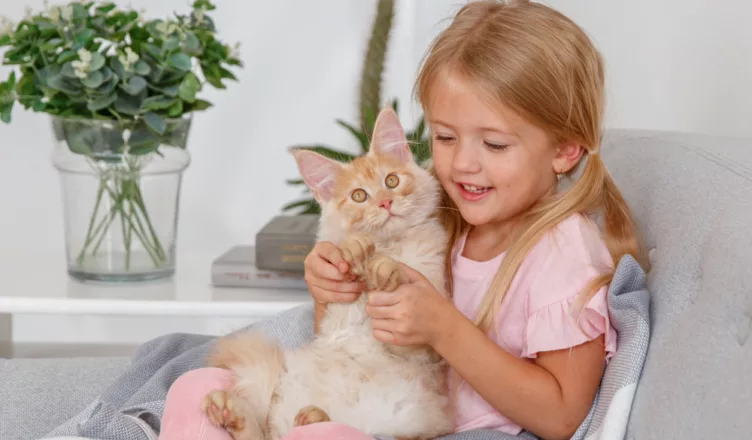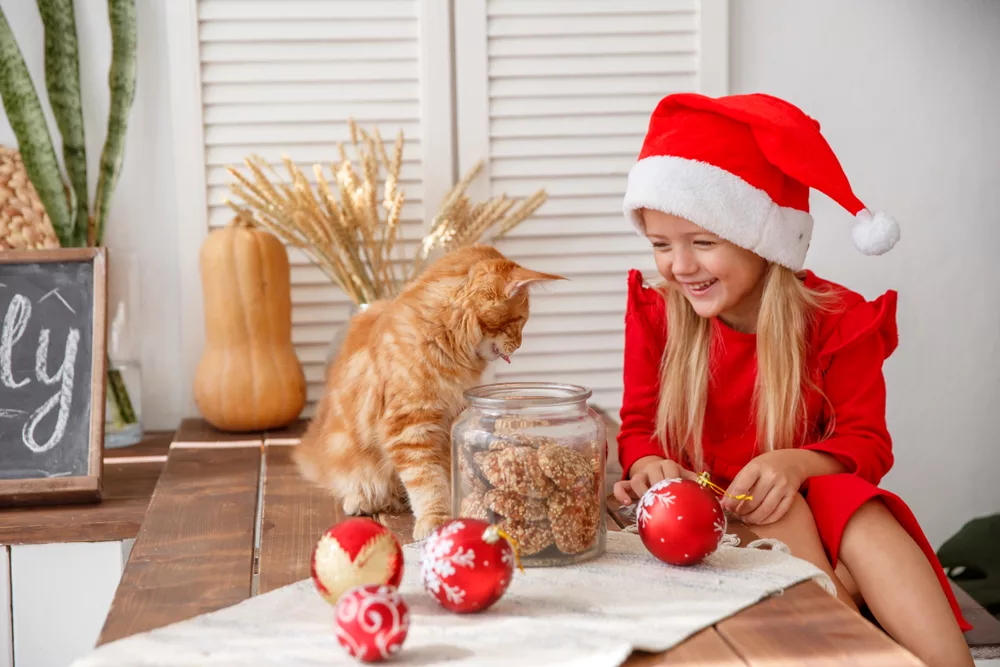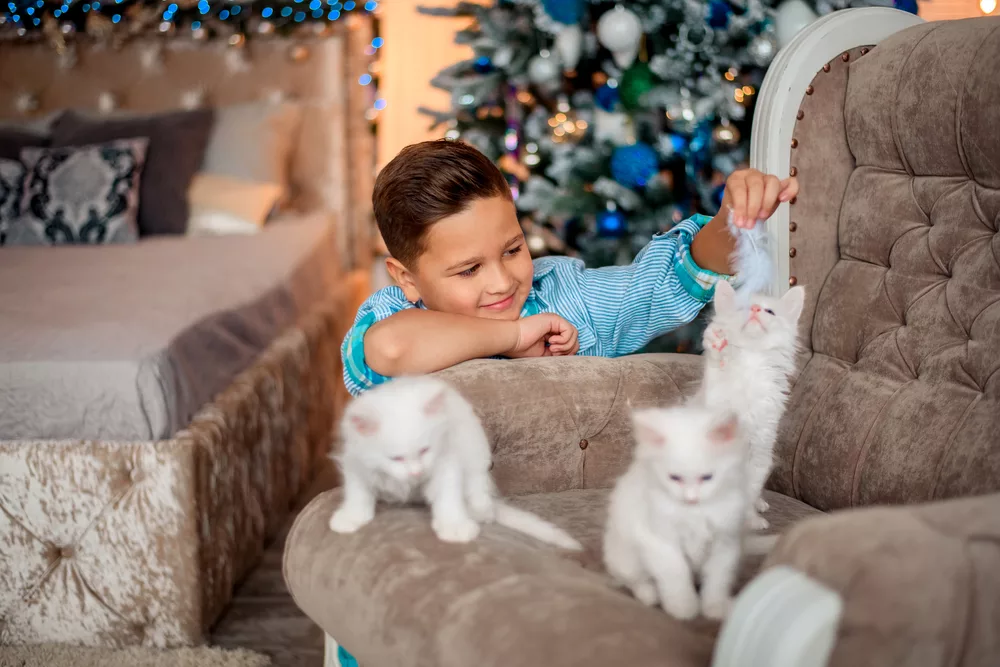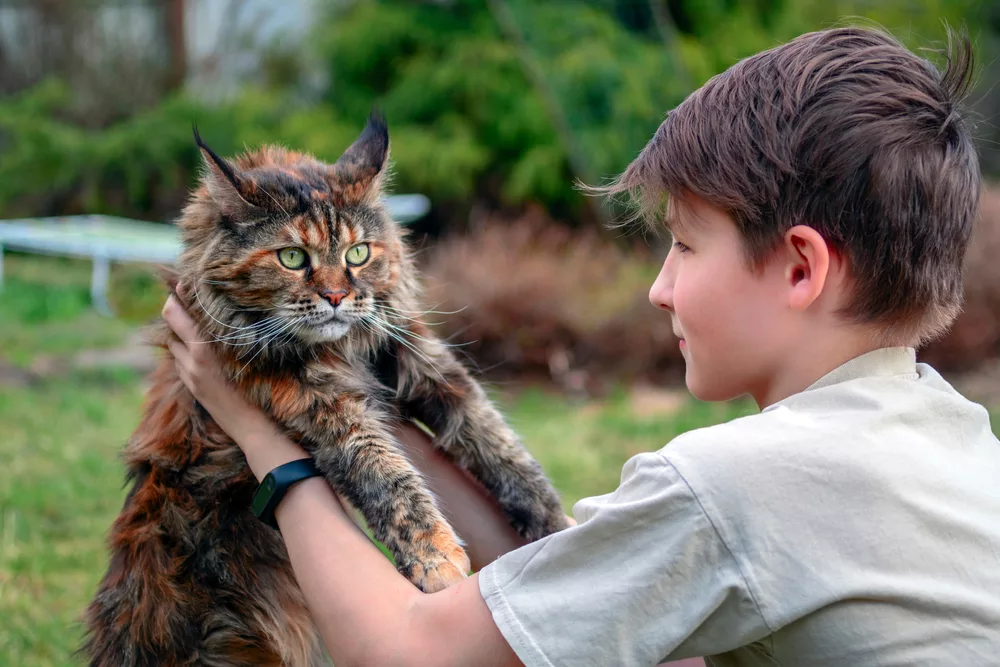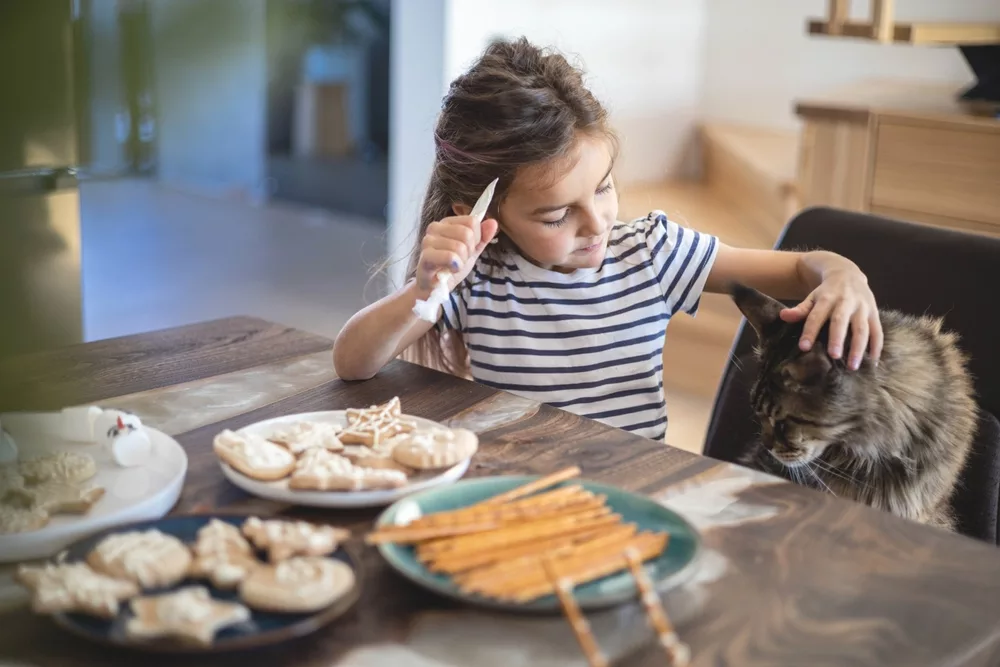Maine Coon cats, the gentle giants of the feline world, are known for their captivating beauty, friendly demeanor, and impressive size. With their affectionate nature, playful antics, loving personalities, and a touch of regal charm, these stunning family pets have a magical way of capturing the hearts of people, young and old. But, are you expecting a baby or considering adopting a Maine Coon cat to your family and wondering, if Maine Coon cats good with children or not?
Don’t worry but read on to explore their compatibility with children of all ages, ensuring you can create a harmonious and magical bond between your feline companion and your little ones.
Characteristics of Maine Coon Cats
Maine Coons are one of the largest domestic cat breeds, easily recognized by their sturdy build, long, bushy tail, and tufted ears. Thanks to their unique and endearing personalities, they are a popular choice for families with children. Some of the striking features of the Maine Coon cat breed include the following:
Friendly and sociable
The Maine Coon breed is known for being outgoing and friendly, which makes it a great companion for children and adults alike. They enjoy interaction with people and other pets and are not as aloof as other cat breeds. They are very loyal to owners and thus called dogs of the cat world.
Gentle and affectionate
The gentle giants are very affectionate with their human companions and family members and often form strong bonds with their owners. This gentle Maine Coon personality makes them a great choice for families, as they can provide comfort and companionship to children.
Intelligent and trainable
Maine Coons are highly intelligent cats, which makes them relatively easy to train. This trait can be especially helpful when teaching them boundaries and appropriate behavior around children. Start Maine Coon training at a young age and select the best Maine Coon name to call your cat. It will help recognize when you call and help you train it easily.
Playful and energetic
Despite their large Maine Coons size, they are quite playful and energetic. They enjoy interactive play and can keep up with active children, making them an excellent choice for families seeking an engaging and lively pet.
Adaptable and easygoing
Maine Coons are known for their adaptability and easygoing nature, making them suitable for various living situations. They can adjust well to changes in their environment and are generally more tolerant of noise and activity than some other cat breeds, which can be an advantage in a household with children.
How are Maine Coon cats with children?
Maine Coons are an ideal choice for families with children due to their unique combination of traits. Their friendly and sociable personalities make them eager to interact with people, including kids, and their gentle and affectionate nature means they are less likely to become aggressive or overly defensive around young babies.
Moreover, their intelligence and trainability make learning boundaries and appropriate behavior around children easier, ensuring a harmonious relationship. Their playful and energetic nature means they can keep up with the energy levels of active children, providing hours of entertainment and wonderful companionship.
Are Maine Coons good around babies?
If you own a Maine Coon cat or a Maine Coon kitten and are expecting a new baby, it’s essential to prepare your feline friend for the upcoming changes in the household. Take the following steps to help your Maine Coon adjust to the new addition:
Gradually introduce baby-related items
Before the baby arrives, introduce baby-related items to your cat, such as a crib, toys, and baby blankets. It will help your cat familiarize with the new objects and smells associated with the baby.
Play recordings of baby sounds
Acclimate your cat to the new sounds they’ll hear once the baby arrives by playing recordings of baby noises, such as crying, cooing, and gurgling. Start with low volume and gradually increase it over time.
Establish designated cat-free zones
Create designated cat-free zones in your home, such as the same room, nursery, or play area, for the baby’s safety and comfort. Use baby gates or closed doors to prevent your cat from entering these spaces.
Provide a safe space for your cat
Ensure your cat has a quiet, safe space to retreat to when they need some alone time, such as a cozy bed or a hiding spot in a quiet room. This will assist your cat in feeling secure and less stressed during the transition.
How do you introduce a Maine Coon to a baby?
While Maine Coon cats are known for their gentle nature, it’s essential to supervise all interactions between your cat and your baby to ensure the safety of both parties. It will help foster positive interactions between your baby and your Maine Coon cat. Some tips for facilitating safe and enjoyable interactions between your baby and your Maine Coon include:
Always be present during interactions
Ensure you’re nearby and closely monitor all interactions between your baby and cat. This will help you quickly intervene if either party becomes uncomfortable or risks injury.
Encourage gentle petting
Teach children to pet the cat gently and avoid any rough handling, such as pulling the cat or kitten’s tail or fur. Reward your cat with praise or treats for calm, gentle behavior around the baby.
Avoid close interactions
If your cat seems unsure or nervous around the new members or the newborn baby, allow them to observe from a safe distance. This will allow them to become familiar with the baby’s presence without feeling threatened or overwhelmed.
Gradually increase interaction time
Start with short, supervised interactions between your baby and your Maine Coon, and gradually increase the duration as both parties become more comfortable with each other.
Teaching Toddler to Interact with Maine Coon cat
As your baby grows into a toddler, it’s important to teach them how to interact safely and respectfully with your Maine Coon cat. Establishing healthy habits and boundaries early on will help create a harmonious relationship between your child and your feline companion. Some key points to teach your toddler include:
Petting gently and avoiding rough play
Show your toddler how to gently stroke the cat and discourage any rough play, such as pulling the cat’s tail or fur. Explain that cats are sensitive and can become scared or hurt if not treated gently.
Respecting the cat’s personal space
Teach your toddler to respect the cat’s personal space by not disturbing them when resting, eating, or using the litter box. Explain that, like people, cats need time alone and space to feel comfortable and safe.
Recognizing body language
Help your toddler understand the cat’s body language, such as flattened ears, hissing, or growling, which may indicate that the cat is uncomfortable or unhappy. Encourage your child to give the cat space when they show signs of discomfort.
Encouraging appropriate play
Show your toddler how to engage in appropriate play with the Maine Coon, such as using Maine Coon toys, playing fetch, or chasing a laser pointer. This will help teach your child how to interact with the cat in a fun and safe manner.
Maine Coon Patience and Tolerance
One of the reasons Maine Coon cats are so well-suited to families with small children is their incredible patience and tolerance. While no cat should be expected to endure rough handling or disrespectful behavior, Maine Coons are generally more forgiving of the occasional misstep by a curious toddler.
Their gentle, patient nature and ability to adapt to different situations make them an excellent choice for families with young children. It’s essential to remember that even the most patient and tolerant cat has limits.
Always supervise interactions between your toddler and your Maine Coon, and intervene if the cat becomes agitated or the child’s behavior becomes too rough. By setting clear boundaries and encouraging respectful interactions, you can foster a positive relationship between your toddler and your Maine Coon cat.
How are Maine Coon cats with children?
As your child grows, a Maine Coon cat can become an excellent companion and friend. Their sociable nature means they’re more likely to engage in play and interactive activities with older children, such as games of fetch, hide and seek, or even learning tricks.
Involving Your Child in the Care of Maine Coon
One of the best practices to encourage a strong bond between your child and your cat is involving your child in Maine Coon care. Encourage your child to help with the following:
Feeding
Teach your child how to properly measure and serve Maine Coon food, ensuring they understand the importance of maintaining a healthy diet for the cat.
Grooming
Instruct your child on how to brush and groom your Maine Coon, emphasizing the need for regular grooming to keep the cat’s fur healthy and free from mats or tangles.
Playtime and exercise
Encourage your child to engage in interactive play with your Maine Coon, such as using toys or playing fetch. This can help keep your cat mentally stimulated and physically active, which is essential for its overall well-being.
Health check-ups and vet visits
Involve your child in the process of monitoring your cat’s health, including regular at-home check-ups and visits to the veterinarian. Teach them to recognize signs of illness or discomfort in the cat and the importance of seeking prompt medical attention when needed.
By involving your child in the care of your Maine Coon cat, you can help them develop a sense of responsibility and empathy while also fostering a strong bond between the two. This deep bond can lead to a lifelong friendship and a deep understanding of the importance of caring for and respecting animals.
Tips for Introducing a Maine Coon to Your Family
A successful introduction of a Maine Coon cat to your family is crucial for fostering a harmonious relationship between the cat and all family members, including young children. Here are some tips to help ensure a smooth and stress-free introduction:
Prepare your home
Before bringing your Maine Coon cat home, create a welcoming and safe environment for them. Set up a designated space with a bed, litter box, food and water dishes, toys, and a scratching post. This will help your new cat feel secure and comfortable in their new surroundings.
Gradual introductions
Avoid overwhelming your cat by introducing them to one family member at a time, starting with the adults. Let the cat approach each person on their terms and encourage gentle petting and interaction. Once your cat seems comfortable with the adults, you can introduce them to your children under close supervision.
Encourage gentle interactions
Teach your children to approach the cat calmly and gently, avoiding sudden movements or loud noises. Show them how to pet the cat gently and respect its personal space.
Use positive reinforcement
Reward your cat with praise, treats, or affection for calm, positive interactions with family members. This will help reinforce the idea that being around people is a good and enjoyable experience.
Maintain routines
Cats thrive on routines, so try to establish and maintain a consistent schedule for feeding, playtime, and Maine Coon grooming. This will help your cat feel secure and adjust quickly to their new environment.
Be patient
Remember that every cat is different; some may take longer to adjust to their new surroundings. Be patient and give your Maine Coon cat plenty of time to adapt and feel comfortable in its new home.
Ensure a Safe and Happy Home for Everyone
Creating a safe and happy home environment for your children and your Maine Coon cat is essential for fostering a harmonious relationship between them. By addressing potential issues and establishing clear boundaries, you can ensure the well-being of everyone in the household. Here are some tips for maintaining a safe and happy home for everyone:
Set Boundaries for Your Children and Maine Coon
Establishing clear boundaries for both your children and your Maine Coon cat is crucial for maintaining a harmonious relationship between them. Ensure your children understand the importance of respecting the cat’s personal space and treating them gently. Some guidelines to establish include:
- Avoid interrupting the cat when they’re eating, sleeping, or using the litter box.
- Do not encourage or engage in rough play with the cat.
- Teach your children to recognize the signs of stress or discomfort in the cat, such as hissing or growling, and to give them space when they display these behaviors.
- Encourage your children to engage in appropriate play and interactions with the cat, using toys or other approved activities.
For your Maine Coon kittens or cats, setting boundaries may involve teaching them not to jump on counters, scratch furniture, or engage in other unwanted behaviors. Use positive reinforcement, such as praise or treats, to reward good behavior and discourage undesirable actions.
Provide Adequate Space for Maine Coon Cats
Maine Coon cats are large and active, so it’s essential to provide them with enough space to move and play. Ensure your home has plenty of cat-friendly areas for your Maine Coon to explore, climb, and hide. Providing your cat with vertical spaces, such as cat trees or shelves, can also help them feel more secure and comfortable in their environment.
Monitor Child’s Interactions with Maine Coon
Regularly monitoring your child’s interactions with your Maine Coon cat is essential for maintaining a healthy and happy relationship between them. Be on the lookout for signs of stress or discomfort in your cat and address any issues as they arise. Encourage open communication with your child about their experiences and feelings towards the cat, and work together to create a positive environment for everyone.
By setting clear boundaries, providing adequate space for your Maine Coon, and monitoring interactions between your child and the cat, you can maintain a safe and happy home environment for everyone. This will help foster a strong bond between your children and your Maine Coon cat, ensuring a lifelong friendship and a positive relationship that benefits everyone in the family.
Creating a Harmonious Home
Maine Coon cats make wonderful companions for children of all ages, thanks to their friendly, gentle, and affectionate nature. By preparing your home, setting boundaries, and fostering a nurturing environment, you can create a harmonious relationship between your Maine Coon cats and your children, resulting in a joyful, loving home for everyone.
The key to success is understanding your family pet Maine Coon’s needs and working with your children to teach them how to interact respectfully and safely with their feline friends. With patience, guidance, and commitment, your family and your Maine Coon cat can build a strong, lasting bond, enriching each other’s lives and creating memories to treasure for years to come.
